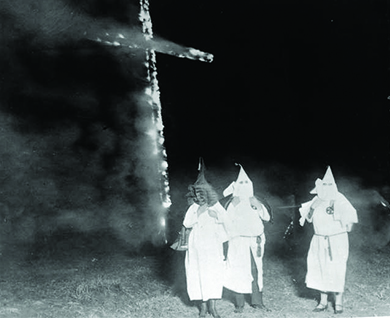| << Chapter < Page | Chapter >> Page > |

The Klan’s newfound popularity proved to be fairly short-lived. Several states effectively combatted the power and influence of the Klan through anti-masking legislation, that is, laws that barred the wearing of masks publicly. As the organization faced a series of public scandals, such as when the Grand Dragon of Indiana was convicted of murdering a white schoolteacher, prominent citizens became less likely to openly express their support for the group without a shield of anonymity. More importantly, influential people and citizen groups explicitly condemned the Klan. Reinhold Niebuhr, a popular Protestant minister and conservative intellectual in Detroit, admonished the group for its ostensibly Protestant zealotry and anti-Catholicism. Jewish organizations, especially the Anti-Defamation League, which had been founded just a couple of years before the reemergence of the Klan, amplified Jewish discontent at being the focus of Klan attention. And the NAACP, which had actively sought to ban the film The Birth of a Nation , worked to lobby congress and educate the public on lynchings. Ultimately, however, it was the Great Depression that put an end to the Klan. As dues-paying members dwindled, the Klan lost its organizational power and sunk into irrelevance until the 1950s.
The sense of degeneration that the Klan and anxiety over mass immigration prompted in the minds of many Americans was in part a response to the process of postwar urbanization. Cities were swiftly becoming centers of opportunity, but the growth of cities, especially the growth of immigrant populations in those cities, sharpened rural discontent over the perception of rapid cultural change. As more of the population flocked to cities for jobs and quality of life, many left behind in rural areas felt that their way of life was being threatened. To rural Americans, the ways of the city seemed sinful and profligate. Urbanites, for their part, viewed rural Americans as hayseeds who were hopelessly behind the times.
In this urban/rural conflict, Tennessee lawmakers drew a battle line over the issue of evolution and its contradiction of the accepted, biblical explanation of history. Charles Darwin had first published his theory of natural selection in 1859, and by the 1920s, many standard textbooks contained information about Darwin’s theory of evolution. Fundamentalist Protestants targeted evolution as representative of all that was wrong with urban society. Tennessee’s Butler Act made it illegal “to teach any theory that denies the story of the Divine Creation of man as taught in the Bible, and to teach instead that man has descended from a lower order of animals.”
The American Civil Liberties Union (ACLU) hoped to challenge the Butler Act as an infringement of the freedom of speech. As a defendant, the ACLU enlisted teacher and coach John Scopes, who suggested that he may have taught evolution while substituting for an ill biology teacher. Town leaders in Dayton, Tennessee, for their part, sensed an opportunity to promote their town, which had lost more than one-third of its population, and welcomed the ACLU to stage a test case against the Butler Act. The ACLU and the town got their wish as the Scopes Monkey Trial , as the newspapers publicized it, quickly turned into a carnival that captured the attention of the country and epitomized the nation’s urban/rural divide ( [link] ).

Notification Switch
Would you like to follow the 'U.s. history' conversation and receive update notifications?